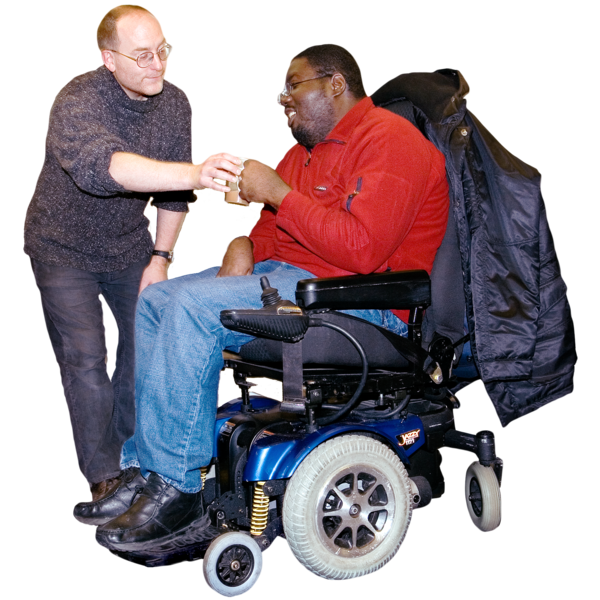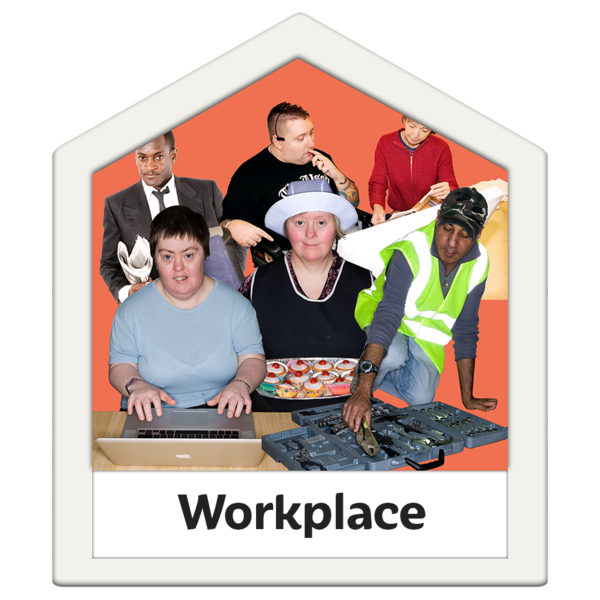Less than 6% of people with a
learning disability
 A learning disability is to do with the way someone's brain works. It makes it harder for someone to learn, understand or do things.
known to their
local authority
A learning disability is to do with the way someone's brain works. It makes it harder for someone to learn, understand or do things.
known to their
local authority
 A local authority is also called a
council
A local authority is also called a
council
 A council is also called a local authority. They are a group of people who make decisions about some of the things in the area where you live. These include: schools,
social care
A council is also called a local authority. They are a group of people who make decisions about some of the things in the area where you live. These include: schools,
social care
 Social care means the services that give care and support to people who need it.
(support for people), parks and dustbin collection.
. They are a group of people who make decisions about some of the things in the area where you live like schools, social care (support for people), parks and dustbin collection.
are in paid
employment
Social care means the services that give care and support to people who need it.
(support for people), parks and dustbin collection.
. They are a group of people who make decisions about some of the things in the area where you live like schools, social care (support for people), parks and dustbin collection.
are in paid
employment
 Employment means having a job.
– 76% of the general population are in paid work [1]. A figure that has stayed stubbornly low for years according to the UK’s leading learning disability charity Mencap this Learning Disability Work Week (Monday 18th – Friday 22nd November 2019).
Employment means having a job.
– 76% of the general population are in paid work [1]. A figure that has stayed stubbornly low for years according to the UK’s leading learning disability charity Mencap this Learning Disability Work Week (Monday 18th – Friday 22nd November 2019).
Inaccessible application forms mean that nearly a third of people with a learning disability found it hard to apply for jobs, according to Mencap’s new
survey
 A survey is when someone asks you to answer some questions.
of 1625 adults with a learning disability in the UK [2].
A survey is when someone asks you to answer some questions.
of 1625 adults with a learning disability in the UK [2].
This Learning Disability Work Week, Mencap aims to show that people with a learning disability can work and can make good employees to change employer attitudes and practices to help open doors for this untapped talent pool.
There are 1.5 million people in the UK with a learning disability, defined as a reduced intellectual ability which affects people for their whole lives. People with a learning disability might take longer to learn new things or may struggle with everyday activities which most of us take for granted, but with the right support, people with a learning disability can develop new skills and make excellent employees. Although 62% of working aged adults with a learning disability want to work, less than 6% of people with a learning disability known to their local authority are in paid employment.
People with a learning disability face many barriers to accessing paid employment. Mencap’s research found that a lack of understanding about learning disability and practical barriers were shutting many people with a learning disability out of employment.
Aaron Plummer, 19, has cerebral palsy and a learning disability. His dream is to run his own hotel business one day.
While still at college, he was applying for jobs and
work experience
 Work experience is when you try out a job to help you learn new skills.
opportunities in the hotel industry without success. He completed Mencap’s supported internship programme, including a work placement set up by Mencap at Novotel Hotel, in 2019.
Work experience is when you try out a job to help you learn new skills.
opportunities in the hotel industry without success. He completed Mencap’s supported internship programme, including a work placement set up by Mencap at Novotel Hotel, in 2019.
After completing his work placement, Aaron successfully applied for a job and now works as a
conference
 A conference is a meeting that lots of people are invited to.
porter in Novotel Waterloo’s food and beverage department.
A conference is a meeting that lots of people are invited to.
porter in Novotel Waterloo’s food and beverage department.
Aaron said:
I couldn’t wait to join the world of work. It has always been my dream to start a business in the hotel industry.
When I was at college, I was looking for anything, like volunteering, just to get experience of working in a hotel. But I wasn’t getting anywhere. No one replied.
Everything changed when Mencap came to present at my school. I knew right away that I wanted to join their supported internship programme. When I started, Mencap supported me to be more independent and more employable. They helped me with time-keeping, looking smart, using the internet safely and also provided travel training. They even got me a work placement in my dream job. When I’ve been on holidays, I’ve stayed in hotels and loved being a guest.
My work experience gave me the real training to get my first job. At the start, my Mencap job coach was there supporting me every day but as I got more confident and more independent they only needed to come in once a week. My work felt normal and I got feedback from my manager
A manager is a boss at work. They tell you what you need to do and give you support if you need it. telling me to keep up the good work. It felt really good to be recognised for my work. I was really proud to get a job at Novotel back in May.
I’d say to anyone who is hungry for work: go for it! If you know that you want to work, do a supported internship. Don’t wait, go for it! You’ll never regret it!
Often all that is needed is small and cost-effective reasonable adjustments to open the doors for people with a learning disability who want to work. In 2018 alone, Mencap supported over nearly 1800 people with a learning disability through our employment programmes, with over 250 people securing employment by the end of it.
Mark Capper, Head of Development at the learning disability charity Mencap, said:
People with a learning disability can work and want to work, and with the right support they can also make really fantastic employees. But currently people with a learning disability are being shut out of work and this is having a negative impact on their quality of life. It limits their independence
Independence means doing things on your own. Making your own choices. , knocks their self-esteem and makes them feel even more excluded from society. We at Mencap want to change this.
People with a learning disability face many barriers to getting into work, but many people with a learning disability often fall at the first hurdle because the recruitment process is inaccessible. Most employers will not even be aware that by having online only application forms and formal interview
An interview is a meeting where you talk to someone or a group of people about something. When you have an interview for a job, you have to answer questions and say why you would be good at the job. The person who gives the best answers is offered the job. processes that they are closing the door on an untapped talent pool. Often all that is needed is small and cost-effective reasonable adjustments in the workplace to open up doors to people with a learning disability who then go on to be committed employees, and that’s where Mencap’s employment programmes can help. Mencap can support employers to ensure that people with a learning disability have greater access to employment opportunities by helping employers with everything from making their application process more accessible through to providing job coaches. That’s why this Learning Disability Work Week, we want to work with more employers to help them make small changes to their workplace to make a big difference for people with a learning disability.
Lorena Vasile, Talent and Culture Coordinator at Novotel London Waterloo, said:
We are so grateful for the support Mencap has offered in the placement of Aaron. We cultivate a very diverse and multicultural team and we are constantly striving to learn and improve on our staff wellbeing. Our industry thrives on passionate people and passion in any form is to be rewarded and looked after, Mencap provided us with guidance
Guidance means being given clear instructions to be able to do something well. on how to best support Aaron in his work placement and integrate him in the team. After we have decided to offer Aaron his well-earned place in our team, we had bimonthly meetings with Mencap to follow up on his performance and the strong relationship he has formed with the Mencap team has helped us be more intuitive and responsive to his needs.
His willingness to succeed and improve has inspired our staff who has not only welcomed him but looked up to him. We all had something to learn from Aaron’s determination for success and just two months after his official employment with us, our team has voted him to be Employee of the month for July 2019.
We encourage all establishments to be open to making reasonable adjustments as it is only though the wellbeing of your talents that your business will succeed!’
Find out more about Learning Disability Work Week (18th – 22nd November 2019) and Mencap’s employment services: www.mencap.org.uk/ldworkweek
#HereIAm
-ENDS-
For further information, contact Mencap’s media team on: media@mencap.org.uk or 020 7696 5414 (including out of hours).
Notes to editors
- NHS Digital (2019). Measures from the Adult Social Care Outcomes Framework, England – 2018-19 and ONS (2019). Labour Market Overview, UK: October 2019.
- Mencap ran a survey with 1625 adults (aged 18+) with a learning disability in the UK. Responses were collected between January and July 2019 using a paper-based and online questionnaire. Please see relevant data tables below.
| Would you like a paid job? Unemployed working age adults (18-64) with a learning disability who say they can work (n=527) |
||
|---|---|---|
| N | % | |
| Yes | 324 | 61.5 |
| No | 97 | 18.4 |
| Don't know | 106 | 20.1 |
Please note: Participants could select more than one answer so percentages total over 100%.
| Which of the following things have stopped you from getting a paid job? Unemployed working age adults (18-64) with a learning disability who say they can and want to work (n=316) |
||
|---|---|---|
| N | % | |
| I find it hard to fill in application forms | 90 | 28.5 |
| I have applied for jobs but I haven't got one | 82 | 25.9 |
| I don't know how to get a job | 74 | 23.4 |
| I am worried about losing my benefits | 67 | 21.2 |
| None of these things have stopped me from getting a paid job | 41 | 13.0 |
| Other | 71 | 22.5 |
3. Research conducted by Mencap and Inclusive Employers in 2015 found that nearly a quarter of employers feel that not all their colleagues would be happy working with somebody with a learning disability. While almost half of employers also admitted that their organisation’s job descriptions, adverts and application forms are not easy for somebody with a learning disability to read and fill in. https://www.mencap.org.uk/press-release/new-research-highlights-how-public-attitudes-contribute-just-58-people-learning
About Mencap
There are approximately 1.5 million people with a learning disability in the UK. Mencap works to support people with a learning disability, their families and carers by fighting to change laws, improve services and access to
education
 Education is when you learn things. When you fill in a form to get a job, education means you write where you went to school, college or university.
, employment and
leisure
Education is when you learn things. When you fill in a form to get a job, education means you write where you went to school, college or university.
, employment and
leisure
 Leisure is when you have time to do things you enjoy like playing sports or going to the pub.
facilities. Mencap supports thousands of people with a learning disability to live their lives the way they want. www.mencap.org.uk
Leisure is when you have time to do things you enjoy like playing sports or going to the pub.
facilities. Mencap supports thousands of people with a learning disability to live their lives the way they want. www.mencap.org.uk
Mencap has a year-long partnership with Virgin Money. The partnerships includes Mencap being charity of the year for the 2020 Virgin Money London Marathon, the largest and most high-profile marathon in the world. The fundraised income from the partnership will directly fund a pioneering programme in schools across the UK called All Move. The programme will bring 1,200 young people with and without a learning disability together through sport to tackle stigma and
discrimination
 Discrimination is when someone is treated differently (usually in a bad way) because of things like their disability or their
religion
Discrimination is when someone is treated differently (usually in a bad way) because of things like their disability or their
religion
 Religion is to do with the things you believe about the world. For example you may believe there is a god or something else. Examples of religions are Christianity, Hinduism, Islam and Judaism.
.
.
Religion is to do with the things you believe about the world. For example you may believe there is a god or something else. Examples of religions are Christianity, Hinduism, Islam and Judaism.
.
.
For Learning Disability Work Week 2019, Mencap and Virgin Money will be co-hosting a business breakfast, supported by the Financial Times, discussing barriers to employment for people with a learning disability and promoting inclusiveness in the workplace.
For advice and information about learning disability and Mencap services in your area, contact Mencap’s freephone Learning Disability Helpline on 0808 808 1111 (9am-3pm, Monday-Friday) or email helpline@mencap.org.uk .
What is a learning disability?
- A learning disability is a reduced intellectual ability which can cause problems with everyday tasks – for example shopping and cooking, or travelling to new places – which affects someone for their whole life;
- Learning disability is not a mental illness or a learning difficulty, such as
dyslexia
 Dyslexia is a learning difficulty. People who have dyslexia can find it hard to read, write and spell.
. Very often the term ‘learning difficulty’ is wrongly used interchangeably with ‘learning disability’;
Dyslexia is a learning difficulty. People who have dyslexia can find it hard to read, write and spell.
. Very often the term ‘learning difficulty’ is wrongly used interchangeably with ‘learning disability’; - People with a learning disability can take longer to learn new things and may need support to develop new skills, understand difficult information and engage with other people. The level of support someone needs is different with every individual. For example, someone with a severe learning disability might need much more support with daily tasks than someone with a mild learning disability.